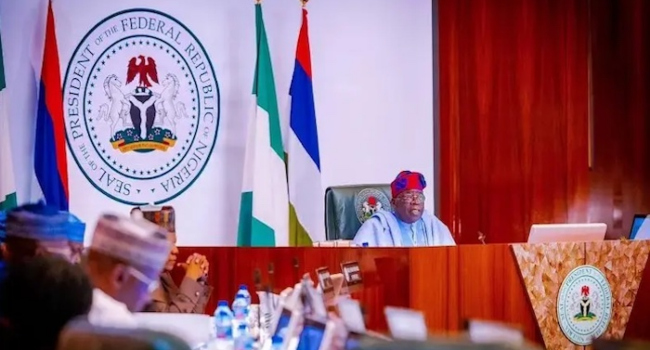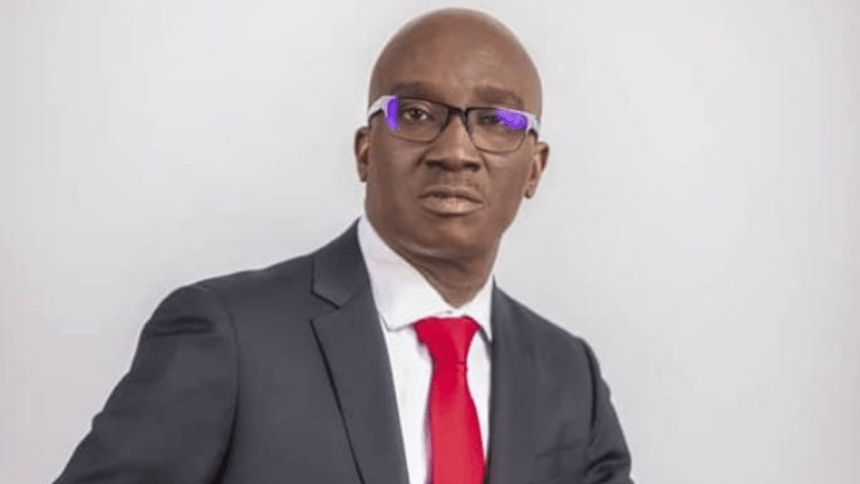The Federal Executive Council (FEC) convened on Monday, September 23, 2024, at the Council Chambers of the State House in Abuja. The meeting, presided over by President Bola Tinubu, was marked by a palpable sense of celebration following the All Progressives Congress (APC) victory in the recent Edo State governorship election, juxtaposed against a moment of reflection for a departed former colleague.
As the council members settled into their seats, the air was thick with anticipation. The Secretary to the Government of the Federation, George Akume, set the tone for the day’s proceedings with a rousing commendation of the APC’s performance in Edo State. His words echoed through the chamber, capturing the mood of jubilation that has swept through the party’s ranks since Saturday’s poll.
“We want to use this opportunity, Mr. Chairman, to congratulate the people of Edo States, particularly the APC family, father of the APC, in their fantastic outing, recording a huge victory, which had eluded the APC for over eight years,” Akume declared, his voice carrying a mix of pride and relief.
The victory in question was no small feat. The Independent National Electoral Commission (INEC) had declared the APC candidate, Monday Okpebholo, as the winner of the hotly contested race. Okpebholo secured a commanding 291,667 votes, outpacing his closest rival, Asue Ighodalo of the Peoples Democratic Party (PDP), who garnered 247,274 votes. The Labour Party’s Olumide Akpata finished a distant third with 22,763 votes.
Akume was quick to tie the APC’s success to President Tinubu’s unwavering commitment to the democratic process. The election has been adjudged to be free and fair, and that is what Mr. President has always stood for,” he emphasized. “We want to thank you, Mr. President, for being committed to the electoral process and ethos of democracy.”
This praise comes at a crucial time for Nigeria’s democracy, as the country continues to grapple with challenges to its electoral integrity. Political analyst Dr. Aisha Mohammed commented on the significance of this acknowledgment: “The FEC’s emphasis on the fairness of the Edo election is a positive sign. It sets a standard that future elections will be measured against.
However, the council’s jubilation was tempered by a solemn moment of remembrance. Before delving into the day’s agenda, the FEC paid tribute to a former colleague, Salome Audu-Jankada, who passed away on August 27, 2024. Audu-Jankada had served as the Minister of Women and Youth Development during former President Olusegun Obasanjo’s administration.
In line with our tradition, Mr. Chairman, may I please request Council members to rise and observe a minute silence in honour of the former Federal Executive Council member,” Akume requested, leading the council in a moment of quiet reflection.
This brief interlude served as a poignant reminder of the continuity of governance and the legacy of those who have served the nation in years past.
As the FEC meeting progressed, discussions inevitably turned to the implications of the APC’s victory in Edo State. Political observers are keenly watching how this shift in power will affect the state’s trajectory.
Local APC supporter Osaze Osagie, reached by phone in Benin City, expressed his optimism: “We’ve been waiting for this change for eight years. Now, we’re hopeful that Okpebholo will bring the development we’ve been yearning for.
However, not everyone shares this enthusiasm. PDP stalwart Emmanuel Imafidon voiced concerns about the transition: “We’re worried about the continuity of ongoing projects. Will the new administration honor the commitments made by the previous government?”
These conflicting viewpoints underscore the challenges that lie ahead for the incoming APC administration in Edo State.
The ripple effects of the Edo election extend far beyond the state’s borders. Political scientist Dr. Chidi Okafor noted, “This victory strengthens the APC’s position nationally. It’s a morale booster for the party and potentially shifts the balance of power in the run-up to the 2027 general elections.
As the FEC meeting continued, with the Chief of Staff to the President, Femi Gbajabiamila, and National Security Adviser, Nuhu Ribadu, in attendance, it was clear that the implications of the Edo election would factor into broader national strategies and policies.
As the FEC meeting drew to a close, the dual themes of electoral triumph and respectful remembrance lingered in the air. The APC’s victory in Edo State has undoubtedly energized the party and reaffirmed its political clout. Yet, the brief moment of silence for a departed colleague served as a somber reminder of the transient nature of political power and the enduring impact of public service.
Looking ahead, all eyes will be on Edo State as the APC prepares to take the reins of governance. The challenges are manifold: bridging political divides, ensuring continuity in development projects, and living up to the high expectations set by a hard-fought campaign.
For President Tinubu and the Federal Executive Council, the Edo election represents both a victory and a responsibility. As they navigate the complex tapestry of Nigerian politics, the commitment to free and fair elections reaffirmed in today’s meeting will be put to the test time and again.
As night falls on Abuja, the echoes of today’s FEC meeting reverberate across the nation. The APC’s triumph in Edo, celebrated within these hallowed chambers, may well set the tone for Nigeria’s political landscape in the months and years to come. Only time will tell if the promises of democracy, so fervently praised today, will translate into tangible progress for the people of Edo State and beyond.



